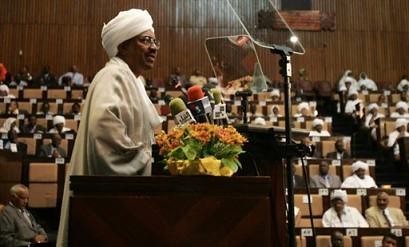
Sudan President Omar al-Bashir is fighting to maintain the sovereignty of his central African nation., a photo by Pan-African News Wire File Photos on Flickr.
Sudan parliament calls South an "enemy"
4:29pm EDT
By Khalid Abdelaziz and Ulf Laessing
KHARTOUM/JUBA (Reuters) - Sudan's parliament branded South Sudan an "enemy" on Monday and called for a swift recapture of a disputed oil-producing region, as rising border tensions pushed the old civil war foes closer to another full-blown conflict.
South Sudan, which seceded from Sudan last July, seized the contested Heglig oilfield last Tuesday, prompting its northern neighbor to vow to recapture the area by "all means".
The oilfield is vital to Sudan's economy, producing about half of the 115,000 barrel-per-day output that remained in its control after South Sudan's secession.
Addressing the Khartoum parliament, speaker Ahmed Ibrahim al-Tahir accused the South's ruling party - the Sudan People's Liberation Movement (SPLM) - of posing a security threat to the north.
"We declare that we will confront the SPLM until we end its rule of the South, and will work to gather our resources to realize this aim," he said. "We are in a battle that does not finish with the recovery of Heglig, but with an end to the danger that comes from South Sudan."
The assembly went on to adopt a resolution describing the SPLM government as "an enemy", but it did not spell out the full implications of the decision.
South Sudanese Information Minister Barnaba Marial Benjamin called the decision "ludicrous". "How can they call us an enemy?" he said.
South Sudan insists Heglig is rightfully part of the South and says it will not withdraw its troops unless the United Nations deploys a neutral force to monitor a ceasefire.
It accused Khartoum on Sunday of reducing the oil facility "to rubble" in an air strike, an accusation denied by Sudan.
"If any damage has occurred in Heglig it may have been on the part of the army of South Sudan," Sudanese Information Minister Abdallah Ali Masar said.
Both sides regularly make conflicting claims. Limited access to the remote region makes it difficult to independently verify their statements.
FIGHTING ECLIPSES NEGOTIATIONS
The clashes have all but killed hopes the two can reach an agreement soon on disputed issues such as demarcation of their 1,800-km (1,200-mile) border, division of national debt and the status of citizens in each other's territory.
South Sudan's military spokesman, Philip Aguer, said the its armed forces had brought 14 prisoners of war to Juba on Sunday, the first to arrive in the South's capital since the fighting in Heglig began.
He said Sudan's army had also shelled a location in the west of South Sudan's Upper Nile state on Sunday. "The army is trying to open other fronts," he said.
Barnaba said at least four people were killed and 21 wounded by air strikes on Sunday on Bentiu and Mayom in South Sudan's Unity state, figures that could not be independently confirmed.
During an aerial bombardment of the area, a U.N. camp in Mayom was hit and its radio room was damaged, but no one was wounded, said Kouider Zerrouk, a United Nations spokesman.
Sudan's armed forces spokesman said Sudan had "no relation" to what was happening in Unity state.
"The Sudanese armed forces are defending their territory after coming under attack from the forces of South Sudan's government and does not bear any responsibility for what happens outside Sudan's borders," spokesman Al-Sawarmi Khalid said, according to state news agency SUNA.
U.S. Ambassador to the United Nations Susan Rice described the bombing which hit the U.N. camp as "particularly condemnable and deplorable".
"This is obviously a subject of grave concern as is the South's continued presence in Heglig and a myriad of violent confrontations in and around the border area and deep into both countries territory," she told reporters on Monday.
In Juba, South Sudan's parliament decided to raise military spending and bolster the army by cutting salaries of all deputies by 10 percent for three months.
"It is better to give the money to the army to defend our country," senior parliamentarian Joy Kwaje told reporters after deputies approved a resolution to support the armed forces and a general mobilization of the military.
(Writing by Alexander Dziadosz; Additional reporting by Michelle Nichols and Alexander Dziadosz Editing by Maria Golovnina)
No comments:
Post a Comment